BBC World Service
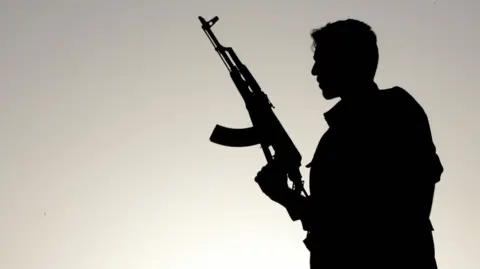 MUSTAFA OZER/AFP via Getty Images)
MUSTAFA OZER/AFP via Getty Images)When the outlawed Kurdistan Workers’ Party (PKK) announced last month that it would disband and end its decades-long insurgency against Turkey, Leila hoped she might soon be reunited with her son.
Three years ago, the former sandwich seller left home to join the group – proscribed as a terrorist organisation by Turkey, the US, UK and EU – in the remote Qandil Mountains, near Iraq’s border with Iran.
Apart from two videos he’s sent, the last in March, Leila hasn’t seen him since.
“When I first heard about the announcement I was very happy,” says Leila, whose name we have changed because she fears reprisals from the group.
“But as time has passed, nothing has changed.”
For 40 years the PKK has been at war with Turkey in a conflict that has killed more than 40,000 people, many of them civilians, and is one of the longest-running in the world.
Some families the BBC spoke to bitterly condemned the PKK, while others spoke proudly of how family members had died fighting for the group and felt this sacrifice had paved the way for peace talks.
The PKK’s announcement that it would stop fighting was seen as a historic moment for Turkey, its Kurdish minority, and neighbouring countries into which the conflict has spilled over.
But since then, no formal peace process with Turkey has begun and there is no official ceasefire in place, with reports of killing continuing on both sides.
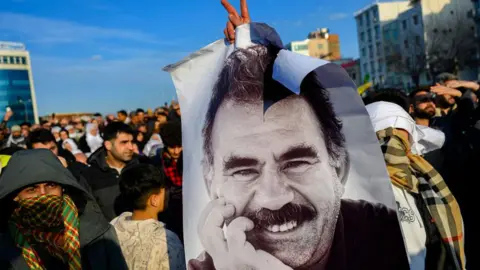 Getty Images
Getty ImagesInitially set up with the aim of fighting for an independent Kurdish state in Turkey, the PKK has, since the 1990s, shifted focus to demand greater cultural and political autonomy for the Kurds.
Leila, who lives in the semi-autonomous Kurdistan Region of Iraq, which borders Turkey, says she hadn’t even heard of the PKK until her son, an Iraqi-Kurd in his twenties, came home one day talking about the group’s ideologies.
She accuses the group of “brainwashing” her son, convincing him they were defending the ethnic Kurdish minorities in Turkey, Iraq, Syria and Iran. The Kurds are the fourth largest ethnic group in the Middle East but do not have a nation state.
Leila says over time her son started to become more independent, making his bed, washing his clothes and doing the dishes. She now believes the PKK was preparing him for the tough life he would soon be living in the mountains.
On the day he left, he came home with three “comrades” to tell his mother he was going to the mountains to begin six months of training.
She says she repeatedly tried to dissuade him from joining the PKK but he was determined to go.
“He was so determined. Arguing with him would have been of no use.”
Since then, Leila says she has regularly visited the Qandil Mountains in the hope of catching a glimpse of her son, but has never seen him.
“If they just let me see him once a year, I would be happy,” she says.
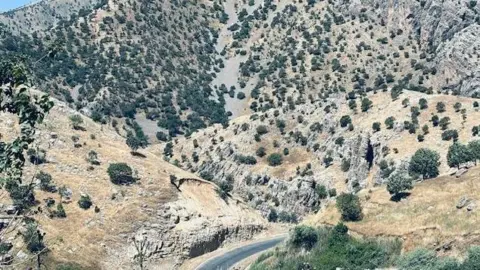
The BBC travelled to the Qandil Mountains, having been granted rare access by the PKK to film there.
The mountains, which are sparsely populated and known for their natural beauty, help shield thousands of PKK fighters from Turkish air strikes.
The journey took hours of driving up narrow, bumpy roads, in an area where there are few signs of inhabitation apart from a handful of farmers and shepherds.
As the BBC approached a PKK checkpoint, we saw large pictures of the group’s leader and founding member Abdullah Ocalan – imprisoned by Turkey in solitary confinement since 1999 – displayed across the mountains. But when the BBC reached the checkpoint, the PKK denied us entry.
We were later told by PKK authorities that talks are underway with the group and they did not want media attention.
They did not say what the talks were about, though Iraq’s Foreign Minister Fuad Mohammed Hussein last month told the BBC discussions would be taking place with the PKK, Turkey, Iraq and the Kurdistan Regional Government to discuss how the group’s weapons will be handed over.
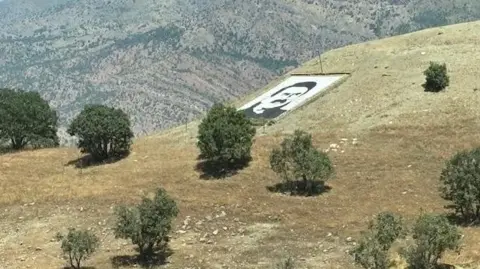
Disarmament ‘not up for discussion’
So far, the terms of a possible peace deal between Turkey and the PKK are unknown.
The PKK told the BBC in a written statement that it is sincere and serious about the process, insisting its leader, Ocalan, must be freed.
“The ball is now in Turkey’s court. A peace process cannot develop based on unilateral steps,” said Zagros Hiwa, the spokesman for the PKK-linked Kurdistan Democratic Communities Union (KCK), an umbrella group of regional Kurdish organisations.
But in a possible sign of the hurdles ahead, a senior local commander, who’s part of the second line of leadership within the group in Iraq, told the BBC in a written statement that in his view disarmament is “not up for discussion”.
Still suspicious about Turkey’s intentions, he adds that “when we address the reasons of the armed conflict, weapons will be of no use for both sides”.
Turkey’s President Recep Tayyip Erdogan’s apparent willingness to bring an end to the conflict with the PKK has been interpreted by some as a bid to attract Kurdish support for a new constitution to extend his 22-year-rule, which he denies.
He has described the PKK’s decision to disband as an important step towards “our goal of a Turkey without terrorism”.
Writing on X, the Turkish president said a new era was about to begin after “the elimination of terror and violence”.
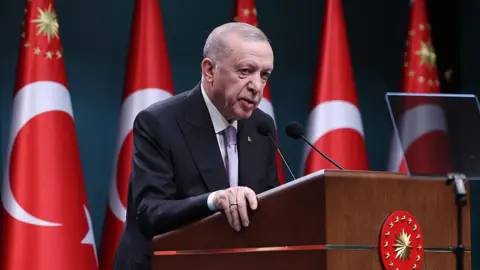 Getty Images
Getty ImagesFor some families whose loved ones were killed fighting for the PKK, the idea the conflict might soon end is bitter-sweet.
Kawa Takoor was 21 when he was killed two years ago. His sister, Rondek Takoor, who lives in Iraqi Kurdish city of Sulaimaniya, last saw him in the Qandil Mountains in 2019.
Speaking from the family home, where photos of Kawa adorn the living room walls, Rondek says her brother’s death changed the family’s life. “I always dream about him,” she says with tearful eyes.
Rondek, who is in her twenties, still remembers the last conversation they had together.
“I asked him if he would like to go back home with me and he said ‘never’. He even asked me to join him in the mountains,” she says.
For Rondek and her family, who are pro-PKK, the group disbanding would be both a moment of “pride and pain, especially after our huge loss”.
She believes that “it’s the sacrifices we’ve made and the martyrs we’ve lost, that paved the way for leaders to talk peace”.
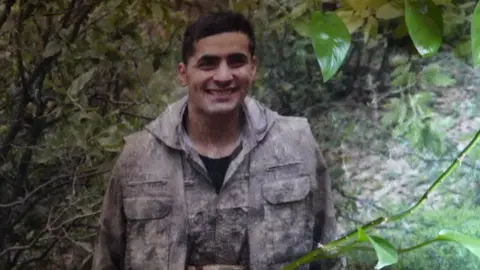
What happens next is uncertain.
There are questions about what would happen to thousands of Turkish PKK fighters and whether they would be allowed to reintegrate into Turkish society.
Turkish officials have yet to say whether these fighters will be treated as criminals and face prosecution. But Turkish media reports have suggested fighters who haven’t committed crimes in Turkey could return without fear of prosecution, though PKK leaders might be forced into exile to other countries or required to stay in Iraq.
It is also unclear what the group disbanding would mean for other Kurdish groups, notably in north-east Syria, which Turkey regards as being off-shoots of the PKK.
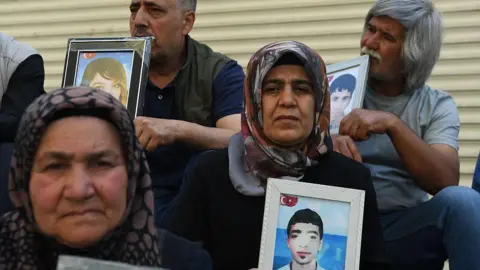 Getty Images
Getty ImagesDuring the Syrian civil war, Turkish forces and Turkish-backed Syrian fighters launched a series of offensives to capture border areas held by a Syrian Kurdish militia called the People’s Protection Units (YPG).
The YPG dominates an alliance of Kurdish and Arab militias called the Syrian Democratic Forces, which drove the Islamic State group out of a quarter of Syria with the help of a US-led multinational coalition.
The YPG says it is a distinct entity from the PKK, but Turkey rejects that and proscribes it as a terrorist organisation.
Erdogan has said the PKK’s decision to disband should “cover all extensions of the organisation in Northern Iraq, Syria and Europe”. SDF commander Mazloum Abdi said the PKK’s decision would “pave the way for a new political and peaceful process in the region”.
However, he has also said that the PKK’s disarmament does not apply to the SDF, which signed a separate deal to merge with the Syrian armed forces in December.
In Iran, the PJAK group, which is also part of the KCK, has told BBC Turkish that it supports the “new process” in Turkey, but that it is not planning to disarm or disband itself.
PJAK is designated as a terrorist organisation by Turkey and Iran. There has been a de facto ceasefire between the group and the Iranian government since 2011.
Turkey says the PJAK is the Iranian arm of the PKK, but the Kurdish groups deny this.
‘This city has brought me nothing but pain’
For mothers like Leila, all the complexities of politics and the intricate balance of military powers across the region are irrelevant. What she cares about is having her son with her again.
“He will come back home when he gets tired of the harsh life in the mountains, at some point he will realise that he can take it no more.”
If this happens, Leila plans to leave their home city where her son was recruited by the PKK.
“This city has brought me nothing but pain.”


